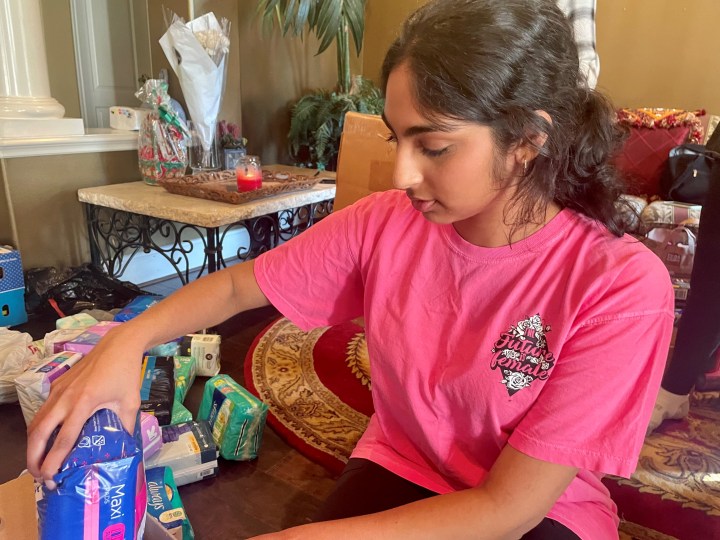
Texas may be the next state to end the sales tax on period products
Texas may be the next state to end the sales tax on period products

Large trash bags and boxes overflowed with thousands of donated tampons, pads and liners at a period packing party hosted by 17-year-old Nitya Pakala.
The Houston-area high schooler and a group of her peers used these supplies to pack up cardboard boxes with products designated for local elementary, middle and high schools where nurses have requested them.
“A few of the schools need thousands of products so it really shows how much they need it,” Pakala said, “We’re aiming to distribute them as soon as possible.”
Pakala is president of Period Pact Houston, one of several organizations in Texas and across the country pushing to make period products more affordable and accessible.
One way they’re making period products cheaper: ending the sales tax on them.
“Women have been paying billions of dollars over many years in tax on these necessities,” said attorney Laura Strausfeld, executive director of Period Law, an organization working to eliminate the sales tax that 22 states still have on period products.
Texas is poised to be the next state to eliminate the sales tax on period products. It’s currently the most populous state taxing these products.
Strausfeld said the tax on tampons treats individuals differently based solely on their sex.
“We argue that there is no comparable product for men. One half of the population is paying an extra tax just because they need them for a biological function,” Strausfeld said.
Eliminating the sales tax for essential products like pads and tampons can increase accessibility for menstruators, especially those experiencing period poverty.
“When we think of period poverty, we often think of it as not being able to afford access to period or menstrual products like tampons or pads,” said George Mason University professor of public health, Jhumka Gupta. “It’s also not having access to facilities to take care of menstrual needs such as access to running water or a private space.”

Professor Gupta surveyed college kids and found 14% of students experienced period poverty in the year prior to taking the study.
“About 10% reported experiencing period poverty on a monthly basis,” she said, adding that Black and Latino students were more likely to say they experienced period poverty.
Another report in the National Library of Medicine found roughly two thirds of the low-income women surveyed couldn’t afford period products at least once in a year. And a different study of high schoolers showed that kids were skipping school because they couldn’t afford pads and tampons.
Laura Strausfeld said she’s glad to see conservative states like Texas move to end taxes on period products that more progressive states already have done away with.
“We think of menstrual equity as part of the larger gender equity movement,” she said. “We have to keep these civil conversations about women’s health going.”
She said the timing “seems absolutely connected” to the abortion ban in Texas. The bill in the Texas legislature isn’t just moving to eliminate the tax on period products, but also diapers, bottles and maternity clothing.
Items currently untaxed in Texas include products like Band-Aids and ChapStick.
“You can buy Viagra untaxed because it’s a prescription drug,” she said.
Texas Gov. Greg Abbott signaled to the Texas Tribune he would sign the legislation to end the tax on menstrual products. House Bill 300 passed the Texas House of Representatives in March.
Strausfeld estimated that eliminating the sales tax on period products in Texas would account for roughly $29 million a year in revenue.
There’s a lot happening in the world. Through it all, Marketplace is here for you.
You rely on Marketplace to break down the world’s events and tell you how it affects you in a fact-based, approachable way. We rely on your financial support to keep making that possible.
Your donation today powers the independent journalism that you rely on. For just $5/month, you can help sustain Marketplace so we can keep reporting on the things that matter to you.










